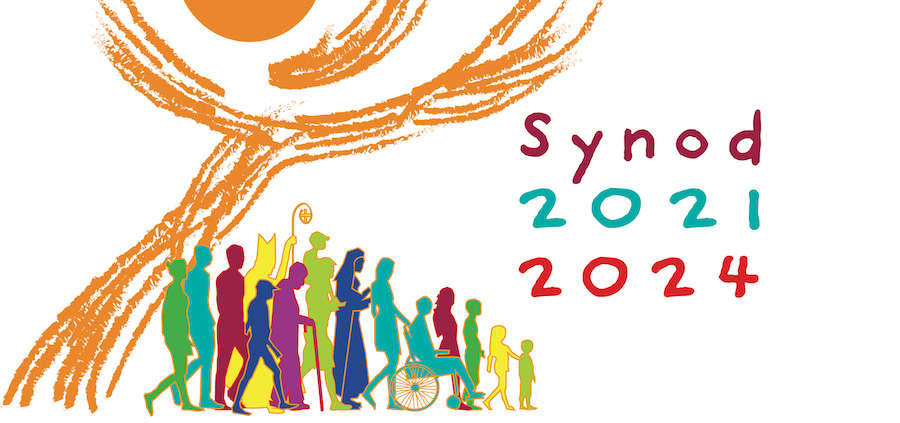Communion and Harmony: Synod Report for October 5, 2023
A theme of fidelity to the Holy Spirit characterized the opening of the Synod on Synodality, which officially commenced with a Mass celebrating the memorial of St. Francis of Assisi on October 4.
In his homily for the Mass, Pope Francis spoke of the “gaze of Jesus” and connected it to the spirituality of the Synod. “This gaze of the Lord that blesses also invites us to be a Church that, with a glad heart, contemplates God’s action and discerns the present,” he said.
He continued, “This is the primary task of the Synod: to refocus our gaze on God, to be a Church that looks mercifully at humanity.”
The Mass coincided with the release of Laudate Deum, an apostolic exhortation on the climate crisis written to build on the messages of Laudato Si’, the encyclical on the environment promulgated in 2015.
In his opening remarks to the Synodal Assembly on Wednesday afternoon, the Synod’s relator general, Cardinal Jean-Claude Hollerich, S.I., thanked the Holy Father for the new exhortation. He urged the assembly “to broaden our vision, from this aula to the whole world.”
Underscoring the role of mission in the work of synodality, he said, “This Church is not made up of only the ordained, bishops, priests and deacons, but by all the baptized who participate in the mission that our Lord Jesus Christ entrusted to her.”
Cardinal Hollerich followed his remarks with a second presentation to explain the working methods of the Synod. He introduced the first “module,” or subject for spiritual conversation among the delegates, titled “For a Synodal Church: An Integral Experience.”
Designed to help the delegates “warm up [their] engines,” this initial module prompts delegates with the following question: “Starting from the journey of the local Churches to which we each belong and from the contents of the Instrumentum Laboris, which distinctive signs of a synodal Church emerge with greater clarity and which deserve greater recognition or should be particularly highlighted or deepened?”
The Instrumentum Laboris is the working document for the Synodal Assembly, and outlines the remaining modules that will guide the delegates’ conversation. The delegates will have through Saturday morning to discuss the first module.
Delegates were also provided with a collection of patristic texts from St. Basil and St. Irenaeus to help them recall the Holy Spirit as “protagonist of the Church’s life” and “harmonic composer of salvation history.” A selection from Basil’s Hexaemeron is characteristic of the tone: “With an indissoluble bond of concord, [God] united the whole world, made up of different parts, in a single communion and harmony, so that even the elements placed at the greatest distance from each other seemed united by affinity.”
On Thursday, Dr. Paolo Ruffini, Prefect of the Vatican’s Dicastery for Communication, led a special briefing to delve deeper into the Synod’s timeline and methodology.
Dr. Ruffini and Sheila Pires, the Communication Officer for the Southern African Catholic Bishops’ Conference and member of the Synod’s communications team, explained that the Synod “pathway” will be divided into three main sections: discussion of the opening module through October 7; discussion of the three priority issues of communion, participation, and mission from October 9 through 21; and conclusions and proposals for the “steps ahead” from October 23 through 28. A concluding Mass will be held on Sunday October 29.
Dr. Ruffini explained how Synod delegates are meeting in “small circles” or working groups for their discussions. Each group has an Expert-facilitator who will help guide the discussion, an appointed Secretary, and an elected Rapporteur.
Working groups will begin by discussing “questions of discernment” posed to the Synodal Assembly amongst themselves. Working groups will then draft a two-page report of their discussion. The report must be approved by an absolute majority of working group members.
From this summary, working groups will select key points to share with the entire Synodal Assembly. There will be opportunities for the assembly to discuss points raised by the working groups.
Each working group will then formulate a final report that incorporates insights from the assembly discussion. The group Rapporteur will deliver the final text of the report to the General Secretariat of the Synod.
This process will be used for each of the discussion topics of the Synod: the initial module, and the three priority issues of communion, participation, and mission. ♦
Michael Centore
Editor, Today’s American Catholic





Thank you for this summation. It makes me want to invoke Gerard Manley Hoplins Paraclete–“Because the Holy Ghost over the bent World broods with warm breast and with ah! bright wings.” May that happen. May discernment be leavened with equal parts intellect and mercy. Many have been pushed out or caught under the heavier canonical wings of the official Church and not under its more sheltering, pastoral aspect. I pray for that Holy Ghost, that discernment.